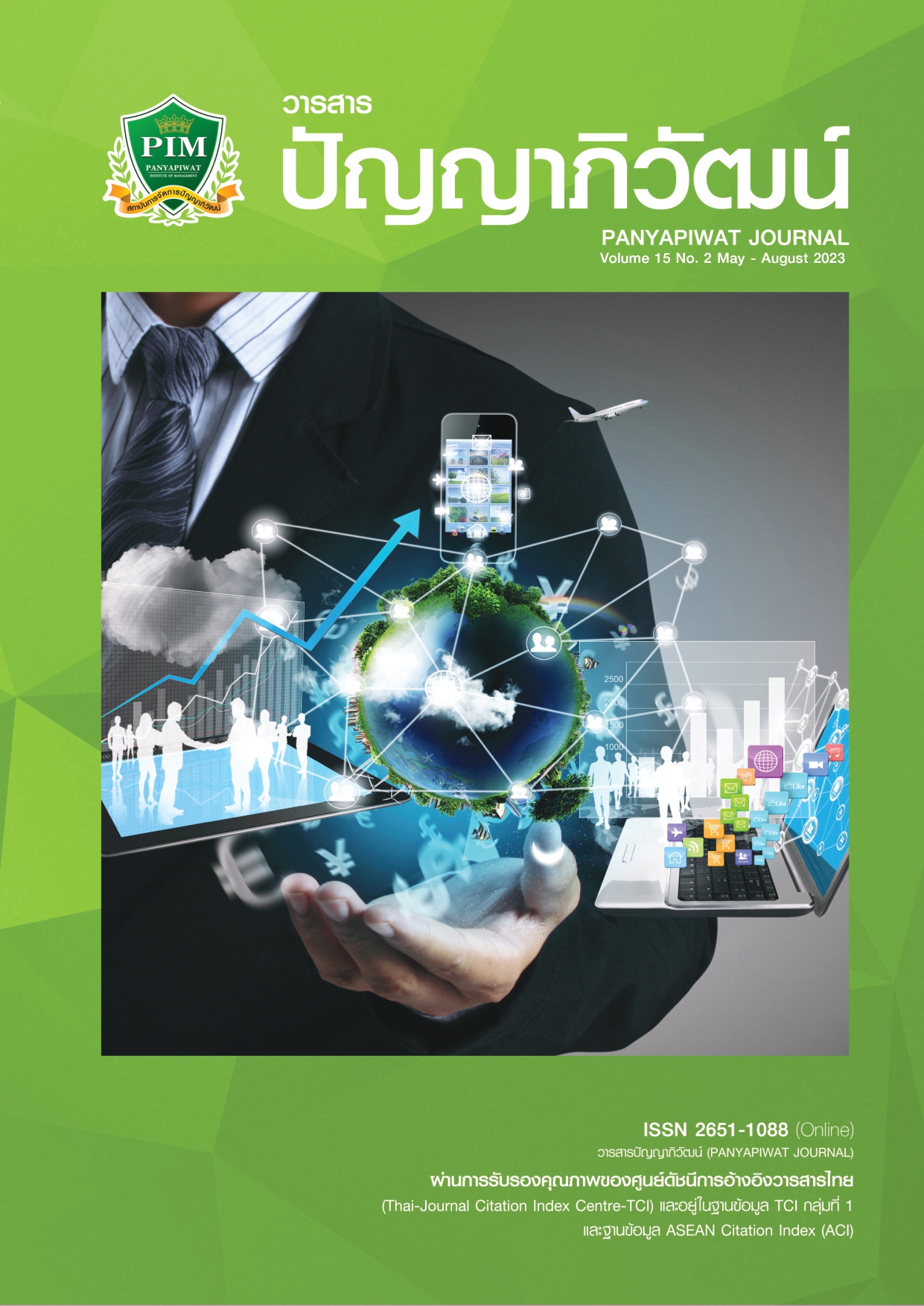อนาคตภาพโรงเรียนอนุบาลเอกชนในชุมชนเมือง
Main Article Content
บทคัดย่อ
การวิจัยนี้มีวัตถุประสงค์ เพื่อทราบอนาคตภาพโรงเรียนอนุบาลเอกชนในชุมชนเมือง โดยใช้เทคนิคการวิจัยเชิงอนาคต แบบ EDFR ผู้ให้ข้อมูลเป็นผู้เชี่ยวชาญ จำนวน 19 ท่าน โดยใช้เทคนิคการเลือกแบบหลักการอ้างอิงด้วยบุคคลและผู้เชี่ยวชาญ เครื่องมือที่ใช้ในการวิจัย ได้แก่ แบบสัมภาษณ์กึ่งโครงสร้าง และแบบสอบถามสถิติที่ใช้ในการวิจัย ได้แก่ ค่ามัธยฐาน ค่าฐานนิยม ค่าพิสัยระหว่างควอไทล์ และการวิเคราะห์เนื้อหา การวิจัยพบว่า อนาคตโรงเรียนอนุบาลเอกชนในชุมชนเมืองประกอบด้วย 6 ด้าน ดังนี้ 1) ด้านบริหารจัดการโรงเรียนที่เน้นการบริหารงานแบบมีส่วนร่วมทั้งจากภายในโรงเรียนและนอกโรงเรียนทั้งในประเทศและต่างประเทศ 2) ด้านหลักสูตรที่เปิดกว้างให้เด็กสามารถเลือกเรียนได้ตามความสนใจและจัดประสบการณ์การเรียนรู้ที่หลากหลายตอบสนองความสนใจและความแตกต่างระหว่างบุคคล 3) ด้านครูและบุคลากรโรงเรียนต้องเข้าใจคุณลักษณะของเด็กยุคใหม่และครูต้องมีทักษะความรู้ความสามารถทั้งด้านการใช้ภาษาและเทคโนโลยีที่เหมาะกับเด็กปฐมวัยในอนาคต 4) ด้านพื้นที่การเรียนรู้และสภาพแวดล้อมของโรงเรียนที่เน้นความสะอาด ความปลอดภัย และเน้นการพึ่งพาพลังงานจากธรรมชาติ 5) ด้านนวัตกรรม สื่อและเทคโนโลยีสำหรับโรงเรียนเลือกใช้ให้เหมาะสมกับพัฒนาการของเด็กในช่วงปฐมวัยและความแตกต่างระหว่างบุคคล และ 6) ด้านความสัมพันธ์ระหว่างโรงเรียนกับชุมชนมีการสร้างเครือข่ายกับชุมชนและองค์กรต่าง ๆ เพื่อทำกิจกรรมร่วมกัน
Article Details

อนุญาตภายใต้เงื่อนไข Creative Commons Attribution-NonCommercial-NoDerivatives 4.0 International License.
“ข้าพเจ้าและผู้เขียนร่วม (ถ้ามี) ขอรับรองว่า บทความที่เสนอมานี้ยังไม่เคยได้รับการตีพิมพ์และไม่ได้อยู่ระหว่างกระบวนการพิจารณาลงตีพิมพ์ในวารสารหรือแหล่งเผยแพร่อื่นใด ข้าพเจ้าและผู้เขียนร่วมยอมรับหลักเกณฑ์การพิจารณาต้นฉบับ ทั้งยินยอมให้กองบรรณาธิการมีสิทธิ์พิจารณาและตรวจแก้ต้นฉบับได้ตามที่เห็นสมควร พร้อมนี้ขอมอบลิขสิทธิ์บทความที่ได้รับการตีพิมพ์ให้แก่สถาบันการจัดการปัญญาภิวัฒน์หากมีการฟ้องร้องเรื่องการละเมิดลิขสิทธิ์เกี่ยวกับภาพ กราฟ ข้อความส่วนใดส่วนหนึ่งและ/หรือข้อคิดเห็นที่ปรากฏในบทความข้าพเจ้าและผู้เขียนร่วมยินยอมรับผิดชอบแต่เพียงฝ่ายเดียว”
เอกสารอ้างอิง
Alme, H. (2021). Nature kindergartens: A space for children’s participation. Journal of Outdoor and Environmental Education, 24(2), 113-131.
Amdonkloi, S. (2013). The role of school administrator in the 21st century. Graduate Studies Journal Pibulsongkram Rajabhat University, 7(1), 1-6. [in Thai]
Boonplung, P. (2017). The scenario of educational administration of early childhood according to community needs. Journal of Nakhonratchasima College, 11(2), 2-9. [in Thai]
Chatyapha, P. (2020). Early childhood classroom management in 21st century. Valaya Alongkorn Review (Humanities and Social Science), 14(3), 223-238. [in Thai]
Drigas, A., & Kokkalia, G. (2014). ICTs in kindergarten. International Journal of Emerging Technologies in Learning, 9(2), 52-58.
Eliason, C., & Jenkins, L. (1994). A practical guide to early childhood curriculum. Macmillan College.
Ernst, J., & Firdevs, B. (2019). Young children’s contributions to sustainability: The influence of nature play on curiosity, executive function skills, creative thinking, and resilience. Sustainability, 11(15), 1-22.
Evergreen and Toronto District School Board. (2013). Landscape and child development a design guide for early years-kindergarten play-learning environment (2nd ed.). Evergreen.
Gestwicki, C. (1999). Developmentally appropriate practice: Curriculum and development in early education (2nd ed.). Delmar Publishers.
Hongsai, T., Kraikitraj, A., & Chugwichean, N. (2020). Environmental management conducive to early childhood acquisition. Journal of MBU LNC, 27(1), 102-110. [in Thai]
Ingwiya, T. (2021). Guide to principles of epidemiology for occupational health and hygiene. Aksorn Graphics and Design Publishing Limited. [in Thai]
Kliewkamoltat, T., Phusri, S., & Duangchatom, K. (2019). The characteristics development model for the 21st century teacher in private schools in Chaiyaphum Province. Journal of Graduate MCU KhonKaen Campus, 6(3), 566-579. [in Thai]
Kotnik, J. (2017). Architectural design guidelines for early childhood education centers and playground. The Council of Europe Development Bank (CEB).
Langka, W. (2016). The scenario of characteristics of Thai teachers in the next deade (A.D. 2017-2026). Journal of Education Research Faculty of Education, Srinakharinwirot University, 11(1), 36-50. [in Thai]
Manessis, D. (2014). The importance of future kindergarten teachers’ beliefs about usefulness of games based learning. International Journal of Game-Based Learning, 4(1), 78-90.
Mata, K. (2020). Organizing early childhood education in the next two decades. Journal of Suan Sunandha Academic and Research Suan Sunandha Rajabhat University, 12(1), 99-110. [in Thai]
Meesomsarn, K., & Silpkityan. K. (2018). Early childhood development in the 4.0’s. Valaya Alongkorn Review (Humanities and Social Science), 8(1), 171-177. [in Thai]
Ministry of Education. (2019). People and nations are built through private education. https://www.moe.go.th/moe/th/news/detail.php?NewsID=40381&Key=news_boontee [in Thai]
Murcia, K., Campbell, C., & Aranda, G. (2018). Trends in early childhood education practice and professional learning with digital technologies. Pedagogika Journal, 68(3), 249-264.
National Association for the Education of Young Children. (2012). Technology and interactive media as tools in early childhood program Serving children from birth through age 8. https://www.naeyc.org/sites/default/fles/globallyshared/downloads/PDFs/resources/
position/statments/ps_technology.pdf
Office of the Education Council. (2019). Global citizenship education development. Sweet Pepper Graphic Publisher. [in Thai]
Office of the National Economic and Social Development Council. (2011). Impact of demographic changes in Thailand. https://thailand.unfpa.org/sites/default/fles/pub-pdf/demographic%20thai.pdf [in Thai]
Office of the Private Education Commission. (2013). Background of private education. https://sites.google.com/site/prachasampan56/khwam-pen-ma-khxng-kar-suksaxekchn [in Thai]
Phoempayoon, P. (2019). The desirable urbanization education. Journal of Educational
Administration Silpakorn University, 10(2), 887-896. [in Thai]
Pholyothin, P. (2017). Early childhood education curriculum concepts. Curriculum for early childhood education and teaching materials for educational management courses. Department of Education, Sukhothai Thammathirat Open University Publisher. [in Thai]
Phuangsomjit, C. (2017). Establishing school-community relationships. Veridian E Journal, Silpakorn University, 10(2), 1342-1353. [in Thai]
Promkan, T. (2017). Characteristics of 21st century teachers in schools with cross-cultural students, Chiang Rai Province. Kasalongkham Research Journal Chiangrai Rajabhat University, 11(2), 95-107. [in Thai]
Santhawee, B. (2017). Conditions and trends in early childhood education’s use of innovative media and technology. Department of Education, Sukhothai Thammathirat Open University Publisher. [in Thai]
Tantichuwet, P. (2014). Educational management guidelines for alpha generation to fit the context of Thai society in the future [Doctoral dissertation]. Chulalongkorn University. [in Thai]
Thitithamraksa, P. (2019). Dealing with gen alpha children with positive energy. https://thepotential.org/2019/11/29/alpha-generation-treat/ [in Thai]
Thongking, P. (2019). The teacher’s role and creating a positive learning environment in the 21st century classroom. CMU Journal of Education, 4(1), 50-57. [in Thai]
Thongliamnak, P. (2021) Explore the impact of COVID-19, a major turning point in the world education. https://www.eef.or.th/article1-02-01-211/ [in Thai]
University of British Columbia. (2019). Emphasizing social play in kindergarten improves academics, reduces teacher burnout. ScienceDaily. https://www.sciencedaily.com/releases/2019/09/190917140317.htm


